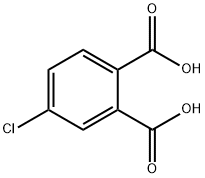4-Chlorophthalic acid is converted into biphenyltetracarboxylic acid by dehalogenation and quantitative reaction, and this compound is useful in industry as a raw material for, for example, heat-resistant resins and resin plasticizers. A known method for producing 4-chlorophthalic acid is, for example, a method of chlorinating phthalic acid in an aqueous medium in the presence of caustic alkali. A common method is to use a caustic alkali aqueous solution in which chlorine is dissolved as a bed solution. Chlorine gas is supplied to react.

